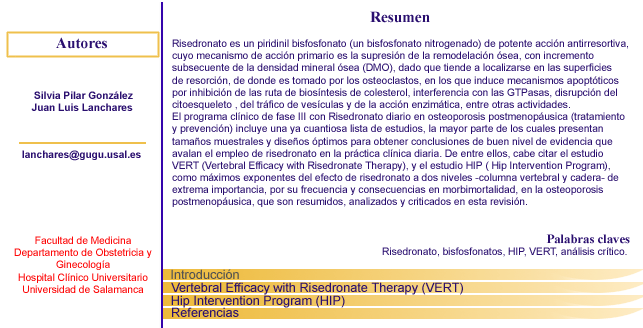



Title
Critical
analysis of the main phase III clinical trials done with risedronate
Abstract
Risedronate is a piridinil bisphosphonate (a nitrogenated bisphosphonate)
with a powerful antiresortive action, it's primary action mechanism is the
supression of bone remodelation, with a subsequent increase of the bone mineral
density (BMD), as it tends to localize at the remove surfaces, from where
it is taken by the osteoclasts and in which it induces apoptotic mechanisms
by inhibition of the colesterol biosynthesis routes, interfering with GTPases
and disruption of the cytoskeleton, vessicle traffic and enzimatic action,
among other activities.
The phase III clinical program
with daily Risedronate in postmenopause osteoporosis (treatment and prevention)
includes an already large list of studies, most of which, present optimal sample
sizes and designs for obtaining conclusions with good levels of evidence that
avail the use of risedronate in daily clinical practice.
Among these, we will cite the VERT (Vertebral Efficacy with Risedronate Therapy)studies,
and the HIP (Hip Intervention Program) studies, as the highest exponents of
the efects of risedronate at two levels -spine and hip- of extreme importance,
because of their frecuency and consequences in morbidity and mortality, in postmenopause
osteoporosis, that are resumed, analyzed y critized in this revision.
Key
words
Risedronate. Bisphosphonates. HIP. VERT. Critical Analysis.
Estudio |
Pacientes
aleatorizados |
Duración
del tratamiento (años) |
VERT
- NA |
2,458 |
3 |
VERT
- Europa |
1,226 |
3 |
Hip
- NA |
4,949 |
3 |
Hip
- Europa |
4,578 |
3 |
DMO
- NA |
648 |
1.5 |
DMO
- Europa |
543 |
2 |
OPM
Prevención |
383
(+111) |
2(3) |
THS/Risedronato |
524 |
1 |
|
Tabla
1 Programa clínico de Fase III con Risedronato en OPM (tratamiento y prevención) |
